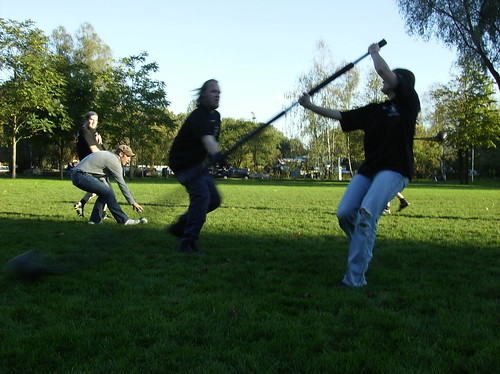A few months ago when I came back from a training I though about all that stuff that we discuss very often. But in the four weeks I spend in Dublin we had not one discussion like this. So I started to compare the Rulebooks.
The version of the irish Rulebook I used was written by Peter Houlihan. This version isn't final but there will be an election about his Rulebook.
Let's start with the point that everybody knew who played once against an irish team. In irish Jugger an double is only a double if the two players hit each other exactly in the same moment. Here I always have the discussion if it's a double or not if I hit somebody with my chain first, but he hits he too. "Was it a half second or not?" Who can make that decision? In this point I think the irish rule is more practicable and more precisely. Here's the part from the irish rules:
The first player to hit the other wins, no matter how close behind the other player was. However if two hits land so close together that the gap between them cannot be distinguished they are considered to have „doubled“ [...]. Either player may call a double and if they insist (if they call it three times or more) both players must accept the double [...]. Also, if one player hits another at the same time as they strike a third the second two players are considered hit.
Another point that is discussed on every tournament is about standing up: A few say you're risen once you stretch your leg, the others say you're risen when you made the first step. And a few others mean you're risen when you make the first move. Once again the irish rules are more precisely:
After a player has completed their count they must attempt to rise immediately if they are unpinned, runners are exempt from this and may stay down as long as they wish. When rising a player may block with their spar as soon as their knee is off the ground, but their hits will not count until half a stone after they have begun their rise.
Well, now we could discuss if it's need's to be a half stone or if that's a too long time to rise, but in this way you don't get a discussion when you're risen or not. In my point of view that's better than the german version.
For the runners it's allowed to stay down tactically. The same for spar players but only if another spar player is in range, after that he must rise immediately. In the german rulebook there isn't an exact definition:
Den Spielern ist es erlaubt, aus taktischen Gründen über die Strafzeit hinaus knien zu bleiben. Für die Dauer des Kniens dürfen Spieler nur gepinnt werden.
In comparison the part from the irish rulebook:
Other players have the option of staying down if another spar player is already within hitting distance. For fixed spars this means that the spar player could touch the rising player without moving their feet, for chain players this means that the chain is within range and half a swing of the rising player.
Another little difference is about pinning. In the german rulebook is written that you can't pin two people at the same time. In the irish rulebook it is:
Only one player may be pinned with one spar at a time however a player with two short swords [but not q-tips] may pin two other players.
That could be useful if you have someone who is good with two short swords.
And what about the chains? In irish rules only a 180° wrap counts as a hit, and if you wrap a spar the first 360° count as a hit if the ball gets you. In my point of view we should add this to the german rulebook and as I know a few teams already handle it this way.
Now the differences for the runners. A point in irish Jugger counts once the skull is in the goal, not when no runner touches it:
A runner is considered to have scored from the moment any part of the skull enters the goal.
Another point is that if you leave the court within the range of a chain you must get down for eight stones.
And about the stones, according to irish rules a stone is 2 seconds and not 1,5 as in the german rules. Also there aren't any limitations for changing players. And the last point is that the court lines aren't part of the pitch.
At the end I can say that in the german rules is more space for interpretation and that the most rules in the irish rulebook are easier. I for my part prefer the irish rulebook.
"A comparsion of the german and the irish Jugger Rulebook" vollständig lesen




